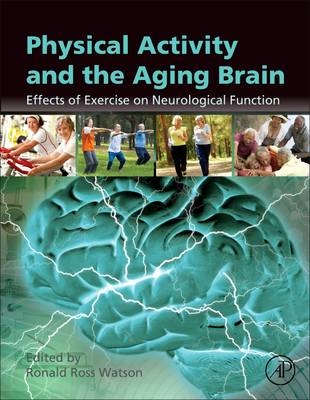
Physical Activity and the Aging Brain
Academic Press Inc (Verlag)
978-0-12-805094-1 (ISBN)
This book examines the role that exercise and physical activity play in halting or modulating the deleterious effects of these numerous aging concerns by first examining the current state of research into how exercise manifests physical changes in the brain. It then discuss how physical activity combines with other lifestyle factors to benefit the aging brain, including nutrition, computerized brain training, and social engagement. Most significantly, it also covers how physical activity can serve as therapy to help alleviate the symptoms of various neurological diseases impacting aging populations, with particular emphasis on Alzheimer’s disease and age-related cognitive decline.
The book provides broad coverage of the effects of exercise and physical activity on the aging brain, its therapeutic effects, and the many factors that influence the aging process.
Ronald Ross Watson, PhD, is Professor of Health Promotion Sciences at the University of Arizona, Mel and Enid Zuckerman College of Public Health. Dr. Watson began his research in public health at the Harvard School of Public Health as a Fellow in 1971 doing field work on vaccines in Saudi Arabia. He has done clinical studies in Colombia, Iran, Egypt, Saudi Arabia and the United States which provides a broad international view of public health. He has served in the military reserve hospital for 17 years with extensive training in medical responses to disasters as the chief biochemistry officer of a general hospital, retiring as a Lt. Colonel. He is a distinguished member of several national and international nutrition, immunology, and cancer societies. Dr. Watson’s career has involved studying many lifestyle aspects for their uses in health promotion. He has edited over 100 biomedical reference books and 450 papers and chapters. His teaching and research focuses on alcohol, tobacco, and drugs of abuse in heart function and disease in mouse models.
Part I. Overview of Exercise and Neurological Changes 1. Effects of Physical Activity on the Cerebral Networks 2. Exercise and the Developing Brain in Children and Adolescents 3. Differential Expression of the Brain Proteome in Physical Training 4. Physical Exercise-Induced Changes in Brain Temperature
Part II. Drugs of Abuse With Exercise to Modify Neurological Structure and Function 5. Physical Activity as a Therapeutic Intervention for Addictive Disorders: Interactions With Methamphetamine 6. Pharmacological Intervention of Brain Neurotransmission Affects Exercise Capacity 7. The Endocannabinoid System and Chronic Disease: Opportunity for Innovative Therapies
Part III. Factors Modulating Exercise in Aging and Neurological Consequences 8. Changes in Cerebral Blood Flow During Steady-State Exercise 9. Biochemical Mechanisms Associated With Exercise-Induced Neuroprotection in Aging Brains and Related Neurological Diseases 10. Role of Melatonin Supplementation During Strenuous Exercise
Part IV. Exercise as Therapy for Neurological Diseases 11. Mechanisms of Functional Recovery With Exercise and Rehabilitation in Spinal Cord Injuries 12. Neural Structure, Connectivity, and Cognition Changes Associated to Physical Exercise 13. The Effect of Exercise on Motor Function and Neuroplasticity in Parkinson’s Disease 14. Physical Exercise and Its Effects on Alzheimer’s Disease 15. Cortical Reorganization in Response to Exercise 16. Exercise Enhances Cognitive Capacity in the Aging Brain
Part V. Lifestyle Exercise Affecting Neurological Structure and Function in Older Adults 17. Synergistic Effects of Combined Physical Activity and Brain Training on Neurological Functions 18. Physical Activity: Effects of Exercise on Neurological Function 19. Update of Nutritional Antioxidants and Antinociceptives on Improving Exercise-Induced Muscle Soreness 20. Effects of Exercise-Altered Immune Functions on Neuroplasticity
| Erscheinungsdatum | 13.01.2017 |
|---|---|
| Verlagsort | San Diego |
| Sprache | englisch |
| Maße | 216 x 276 mm |
| Gewicht | 880 g |
| Themenwelt | Medizin / Pharmazie ► Medizinische Fachgebiete ► Geriatrie |
| Studium ► 1. Studienabschnitt (Vorklinik) ► Physiologie | |
| Naturwissenschaften ► Biologie ► Humanbiologie | |
| Naturwissenschaften ► Biologie ► Zoologie | |
| ISBN-10 | 0-12-805094-2 / 0128050942 |
| ISBN-13 | 978-0-12-805094-1 / 9780128050941 |
| Zustand | Neuware |
| Haben Sie eine Frage zum Produkt? |
aus dem Bereich


